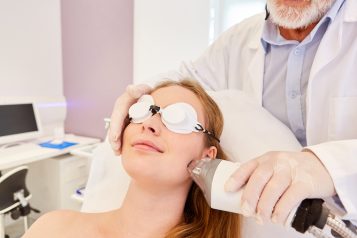 Photo Credit: Shutterstock
Photo Credit: Shutterstock
Breast implant surgery is an exciting time for many, especially when it has been at the top of their bucket list. As the surgery is underway and you walk out, with your end goal intact, the first thing you want to do is snap back to reality. Unfortunately, surgery is invasive, so you must give yourself time to heal after the procedure. This being a main concern, we sat down with Haute Beauty expert Dr. Yuly Gorodisky to get the post-operation facts, guidelines, and what to know about breast implants down the line; here’s what he shared.
What should patients know when it comes to all things post-op?
Patients should give themselves time to heal after surgery. I recommend avoiding lifting arms above the shoulders and picking up objects over 10 lbs for about 2 weeks after surgery. It is important to massage the implants to allow them to soften after surgery and help them settle into place.
The key things to know about breast implant surgery:
- Avoid smoking before or after surgery.
- Follow post-operative instructions.
- Have realistic expectations.
- Be honest with yourself and not be influenced by others.
- Some breast transformations are just impossible, and perfection is the goal but not a guarantee.
- Breasts of the same woman are almost never exactly the same.
- Be prepared for a psychological adjustment to your new body.
- Changing your body is a very personal decision that has to be made carefully, considering all the risks, and with a trustworthy and experienced surgeon.
 Photo Credit: Shutterstock
Photo Credit: Shutterstock
What is the most common problem with breast implants?
The most common problem that develops after breast augmentation is “capsular contracture,” or scar tissue that develops around the implant, making them feel firm. One of the ways to prevent and/or treat a capsular contracture is with ASPEN therapy. This treatment may be performed prophylactically after surgery or as soon as capsular contracture is detected. Sometimes a capsule develops despite all the efforts, and the only way to improve it is with additional surgery.
Breast implant longevity, what is it? Can it be prolonged?
Implants may need to be replaced if they cause problems or if the patient’s body changes over time. After a number of years, breasts may droop or change their size, and the implants may need to be replaced to fit these changes. The risk of implants leaking increases by about 1% every year, so after 10 years, there is about a 10% chance of a leak, and after 50 years, there's likely a 50/50 chance that the implants are leaking. Leaks are not dangerous, but implants should be replaced if found. If the implants are filled with saline solution, they will show a leak by deflating. If they are filled with silicone, they may not show a leak until evaluated with an ultrasound or an MRI of the breasts.






















